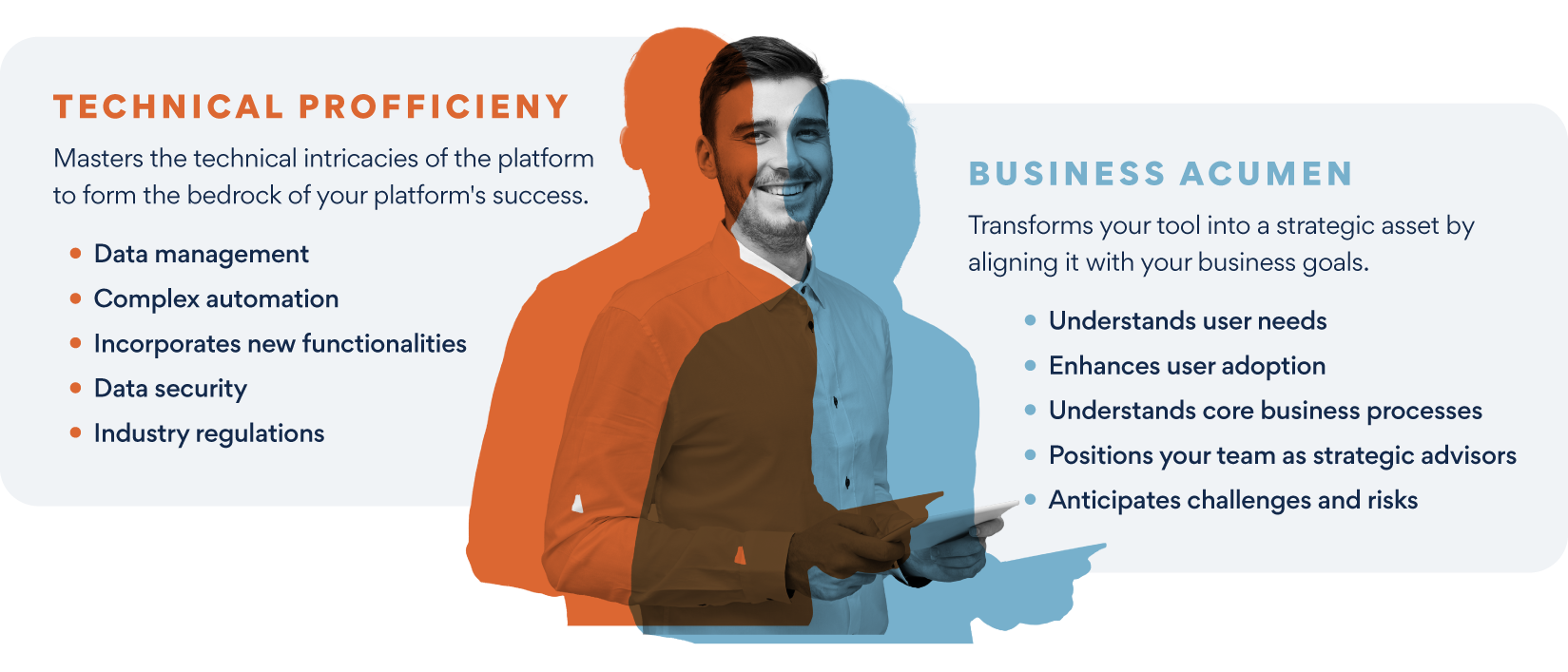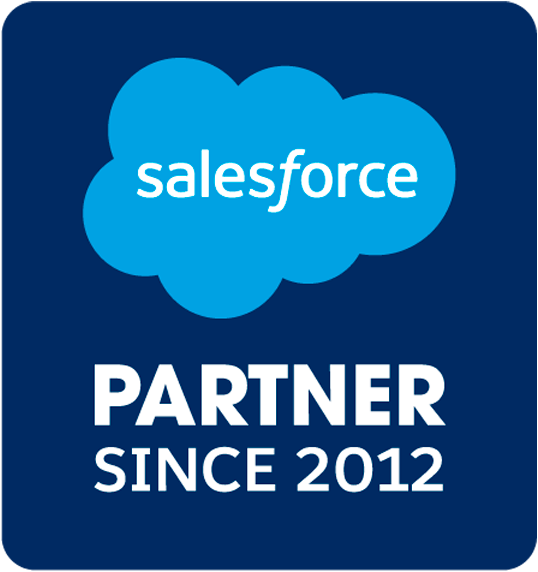Technical Proficiency vs. Business Acumen
Technical Proficiency
A high-performing Salesforce Admin team must master the technical intricacies of the platform. From data management to complex automation, technical proficiency forms the bedrock of success.- Teams with technical proficiency explore and utilize the full spectrum of Salesforce features.
- Regularly incorporating new functionalities keeps your team ahead of the curve, maximizing the value derived from Salesforce updates and innovations.
- A team with technical proficiency prioritizes data security and compliance, safeguarding critical information while adhering to industry regulations.
Business Acumen
Beyond technical know-how, an admin team armed with business acumen can transform Salesforce from a tool to a strategic asset. Understanding business processes ensures that technical configurations align seamlessly with overarching goals.- Admins with business acumen design interfaces that align with user needs, enhancing user adoption and satisfaction.
- Understanding business processes positions your team as strategic advisors, influencing decision-making at the executive level.
- A business-savvy team anticipates challenges, mitigates risks, and ensures the Salesforce platform aligns seamlessly with business continuity.

Spotting the Cracks: Signs of an Unbalanced Team
Drowning in Technical Expertise
You’ve spent years (and significant dollars) hiring the brightest technical talent to support your Salesforce platform. However, your business is not seeing the outcomes you expected. If you have a team that excels in technical expertise but struggles to translate it into meaningful business outcomes, they are likely disconnected from the company's strategic vision.Business Blind Spots
Conversely, you may have grown your team internally and put someone previously on the business side into the Salesforce admin role. They understand business processes and the company’s strategic vision. However, your Salesforce platform seems to be held back. They lack the technical finesse required to maximize your Salesforce capabilities. This imbalance hinders efficiency and innovation.How-To Guide: Practical Steps to Achieve High-Performing Salesforce Admin Teams
Continuous Learning
Regular training and Salesforce certifications ensure your team remains at the forefront of platform advancements, enhancing technical proficiency. Here are a few examples of the most common types of training available for your Admin team:- Official Salesforce Training: Salesforce offers official training programs through its online learning platform, Trailhead. Trailhead provides a variety of modules and trails to help users learn Salesforce at their own pace.
- Certification Courses: Salesforce certifications are widely recognized in the industry. There are certifications for different roles, such as Administrator, Developer, Consultant, and more. Training courses and exam guides specifically designed for certification preparation are also available.
- Salesforce Conferences: Salesforce conferences — like Dreamforce, TrailblazerDX, Tableau Conference, and Connections — offer a comprehensive learning experience for Admins, combining education, networking, and practical skills development. By actively participating in these events, Admins can stay at the forefront of the Salesforce ecosystem and continuously enhance their expertise.
- Community Events and User Groups: Participating in local Salesforce user groups or community events can provide networking opportunities and access to experienced professionals who can share insights and tips.
- Books and Documentation: Salesforce provides extensive documentation, and there are many books available on the subject. These resources can be helpful for individuals who prefer self-paced learning.
Nurturing Cross-Functional Collaboration
Promote collaboration between your Salesforce Admins and other departments. This cross-functional synergy breaks down silos and ensures technical decisions align with broader business strategies. Here are a few practical ways to help promote cross-departmental collaboration and help your Admin teams achieve balance.- Mentorship Programs: Establish mentorship programs where your Admin team members are paired with experienced individuals from other departments. For instance, a Salesforce Admin could be mentored by someone from the marketing or sales team. This facilitates knowledge exchange and helps the Admin understand the specific challenges and goals of different business functions.
- Lunch and Learn Sessions: Organize regular "Lunch and Learn" sessions where representatives from various departments share insights and experiences. These informal gatherings create a platform for open discussions, allowing Salesforce Admin professionals to learn about the goals, challenges, and innovations in other parts of the business.
- Task Forces for Continuous Improvement: Create cross-functional task forces aimed at identifying areas for continuous improvement. Admin team members can work alongside employees from other departments to analyze processes, suggest technological enhancements, and collectively contribute to optimizing workflows across the organization.
- Job Shadowing Initiatives: Implement job shadowing opportunities, allowing Admin team members to spend a designated period working closely with employees from other departments. This hands-on experience provides insights into daily operations, challenges, and workflows, fostering a deeper understanding of how Salesforce solutions can better align with the needs of different teams.
Measuring Your Team's Success: KPIs for High-Performing Salesforce Admin Teams
Define key performance indicators (KPIs) that measure both technical and business-oriented aspects. This ensures your team's success is quantifiable and aligned with organizational goals. Here a few examples of ways to track your team's success:- User Adoption Rate: High user adoption rates indicate that technical configurations align with user needs, translating into improved productivity and satisfaction. Therefore, you should measure the percentage of users actively engaging with the Salesforce platform. This KPI indicates how well the technical solutions implemented by the team are embraced by end-users, reflecting both technical effectiveness and alignment with business needs.
- Time-to-Resolution for Support Requests: Efficient issue resolution demonstrates a balanced team that can address technical challenges promptly, minimizing disruptions. Track the average time it takes for the team to resolve support requests related to Salesforce issues. A lower time-to-resolution suggests strong technical troubleshooting skills, while understanding the urgency of business needs.
- Business Process Efficiency Improvement: Measure the percentage improvement in business processes achieved through Salesforce optimizations. This KPI evaluates how well the team's technical solutions contribute to streamlining and enhancing business processes, showcasing the integration of technical skills with a focus on business goals.
- Training Effectiveness: Assess the effectiveness of training programs conducted for end-users. This KPI considers both the technical content and how well users grasp and apply the knowledge. A higher training effectiveness score indicates that the team is successful in bridging the gap between technical complexity and user understanding.
- Alignment with Business Goals: The ultimate measure of success should be measured against its contribution to overarching business goals and objectives.




